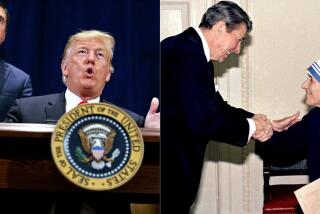Gingrich’s ‘outsider’ gambit
Declaring victory in the South Carolina Republican primary on Saturday night, a glowering Newt Gingrich declared himself apart from the “elites in Washington and New York.” These elites, Gingrich declared, “have no understanding, no care, no concern, no reliability,” and are trying to “force us to quit being American.”
There’s nothing new or particularly original about a candidate seeking to distance himself from the East Coast establishment. Richard Nixon famously displayed the chip on his shoulder throughout his aggrieved political life, and Spiro Agnew once memorably denounced the “nattering nabobs of negativism,” by which he meant the news media. (The phrase, incidentally, was coined by speechwriter William Safire, later a leading member of the Washington media elite). Jimmy Carter campaigned as a humble peanut farmer and Washington outsider. But it’s particularly rich to have Gingrich attempt to position himself as an outsider.
Gingrich served 10 terms in Congress and was speaker of the House from 1995 to 1999. In that post, he was two heartbeats from the presidency, and he was the galvanizing force of the GOP’s return to power. In other words, he was near the pinnacle of the rarefied Washington elite. As for the “New York” half of his sneering denunciation — a reference to the media he’s been lambasting for weeks — it is worth recalling that Gingrich is a prolific book writer who once received a $4.5-million advance, which he was forced to return after ethics questions were raised about it. And need one even mention that he has made his fortune in Washington (he earned $1.6 million, for instance, giving “strategic advice” to Freddie Mac, the quasi-governmental mortgage giant) or that he and his wife maintained a credit line at Tiffany? Surely that qualifies as admission to some sort of elite.
Moreover, Gingrich likes to argue that he’s an outsider — and then simultaneously claim credit for all kinds of insider success. He boasts that he helped create jobs with Ronald Reagan and Bill Clinton. But how, if he was outside the “elite”? The answer, of course, is that he didn’t. Whatever Gingrich’s accomplishments or defects, they were racked up at the center of the nation’s political life, where he has dwelled for years.
As the campaign moves forward, the map still favors Mitt Romney, who has the organization and money to play in big states. But what could have been a cakewalk for the former Massachusetts governor now looks like a challenge. In one week, Romney went from possibly sweeping the first three GOP contests to losing two of them. He’s yet to show strength among conservatives, especially religious conservatives, and he’s failed to dispatch Gingrich. Now, a multimillionaire private equity manager whose tax rate is about 15% will compete with a multimillionaire Washington politician who relishes his access to power. And the two will, amusingly, compete to convince voters that each is an authentic outsider with a common touch.
More to Read
A cure for the common opinion
Get thought-provoking perspectives with our weekly newsletter.
You may occasionally receive promotional content from the Los Angeles Times.










